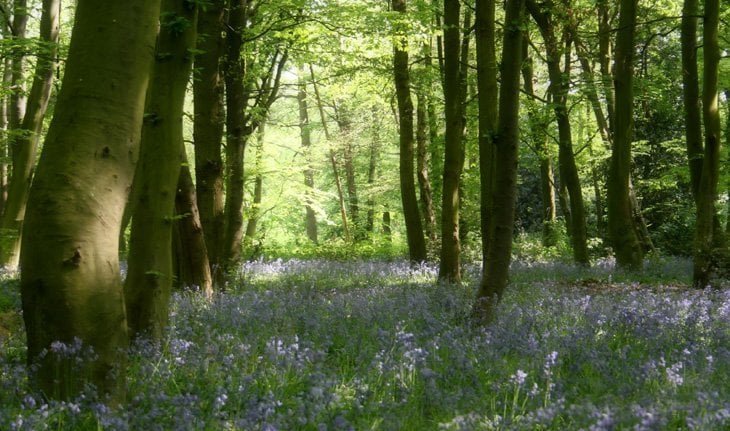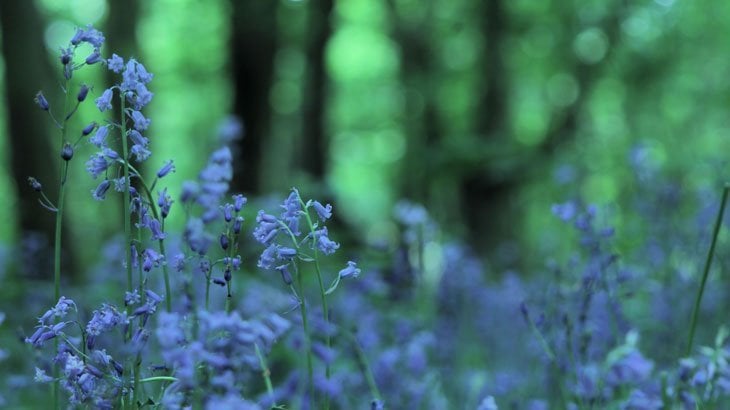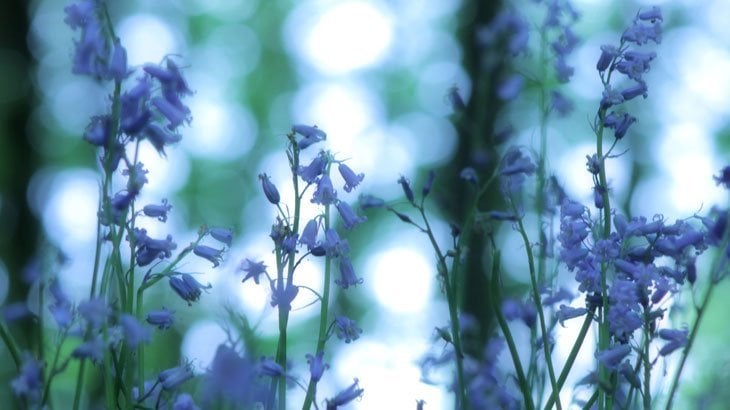Every year in early Spring, many of Britain’s ancient woodlands undergo a magical transformation. A carpet of blue, delicate flowers lining a woodland glade is a magical sight and there is something truly enchanting about stepping into a bluebell wood.

Bluebell Woods capture the imagination of photographers and nature-lovers everywhere. I enjoy watching visitors treading carefully along woodland paths – avoiding the delicate stems and bulbs, and taking the time to savour the sight and delicate perfume. Young children often seem mesmerised in Bluebell Woods.

Such is our fascination with bluebells; organisations such as The National Trust and The Woodland Trust have dedicated webpages detailing where the best bluebells can be seen and photographed in the UK.
As sunlight flickers through the trees, the fragile flowers are dappled in light – a dreamy haze of blues – no wonder bluebells are associated with wonderment and fairy folklore.


It is thought that over half of the world’s population of the ‘Common Bluebell’ (Hyacinthoides non-scripta) are to be found in the UK. The Common Bluebell is the native British bluebell, and is a protected woodland species – at risk of people illegally digging up the bulbs and picking the flowers. But this flower is now seriously threatened by the introduction of the robust, vigorous Spanish Bluebell (Hyacinthoides hispanica). This species is sold as a garden plant and is producing hybrids with the native population. It is feared that these bluebell hybrids (Hyacinthoides x massartiana) – whilst very beautiful – will over time overtake the native bluebell characteristics. Some British woods have already been invaded by the more dominant Spanish Bluebell.
To identify bluebells, look closely at the flowers. The Common Bluebell starts as a rich cobalt blue as the petals open, which gradually fades to a lighter shade of blue. The bells tend to be long and narrow; and the petals are deeply curled back. The anthers (the little pollen sacks at the top of the stamens in the flowers) are a cream colour. The flowers droop gently to one side, on a slim stem and they have a strong, sweet scent.

The Spanish variety has a thicker, more upright stem, with flowers all the way around. The bells are paler and wider, with less curly petals and the anthers are often blue. They have little or no scent. Despite their name, bluebells can also be white due to a genetic mutation and even pink (although the pink ones are more likely to be Spanish…) The hybrid bluebells have characteristics from both parent plants, which can make them very tricky to identify.

Whilst the robust Spanish bluebell and its hybrids are all very beautiful; there is something uniquely special about the fragility of the Common Bluebell. Hopefully our native species will survive the new competition and continue to inspire future generations who visit our ancient woods.


Bluebells Revisited….
It was such a pleasure to photograph and blog about the beautiful native bluebells of Epping Forest last year. Judging by the comments, the little bell-shaped flowers really do seem to capture the imagination of young and old.
So this year – camera in hand – I trod lightly through the Spring forest again, to try and capture their transient beauty once more. Entering the bluebell wood, I was reminded how time can fly when strolling quietly along the paths between the flowers.

When the sun shone brightly, the flowers would light up. Back-lit and hazy, their dreamy blue hues would become almost translucent.

But then, when the clouds passed overhead; the bluebells would instantly become a deeper shade of blue. As a breeze rippled through the woods, so the flowers would move, like swaying sapphires.

Beneath the shade of the trees, the little flowers were a blur of cobalt blues. I waited for the sunshine to reappear. Finally, as the sun broke through the clouds, shards of light pierced through the trees, throwing spotlights on the forest floor. The bluebell carpet suddenly became of patchwork of blue; dark hues interspersed with pale sunlit patches.

The tiny flowers grow so closely together that they do resemble a woodland carpet – and the UK is believed to have the finest ‘bluebell carpets’ in the world. They tend to appear in April / May; during which time they provide woodland visitors with a wonderful spectacle that lasts only a few weeks. They tend to come into bloom in the south, before gradually blooming towards the north.

Native bluebells can also be found in various shades of lilac and even white.
There are some fascinating facts and folklore surrounding bluebells. (The Woodland Trust website has a good section on this if you want to find out more.) In Elizabethan times, bluebell bulbs were crushed to provide the starch used on the fashionable ruff collars and sleeves. The sap from bluebells was used to bind pages into the spines of books. It is also believed to have been used in the Bronze Age to fletch (attach feathers to) arrows.

The delicate native bluebell in the UK is under threat from the vigorous Spanish bluebell.
Hope you enjoy them!









What absolutely beautiful photos. Lovely
(And I know taking decent photos of bluebell woods is much harder than it looks!)
Beautiful pictures! I love the filter on them, it makes them so whimsical and magical. If I ever make it to the UK in the Spring I will be sure to visit these woodlands.
cheers~Erin
Very informative. I’ll be on the lookout now. It’s not too far away.(Spring, that is)
Thank you! Glad you like the pictures – they’re quite magical in a woodland aren’t they? 🙂
Great photos and excellent use of depth of field on those close ups really enjoyed the photos
This is definitely magical and charming. Very pleasing in the eyes.
Beautiful pictures of the bluebells, we love walking through bluebell woods. We have some nice ones around where I live – we also love walking through a carpet of wild garlic.
I’ve always wanted to be in a bluebell wood during the perfect weather conditions……I’m hopeful it will still happen 🙂